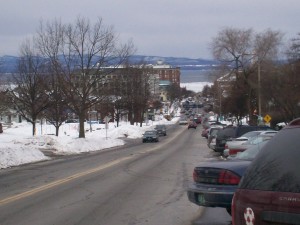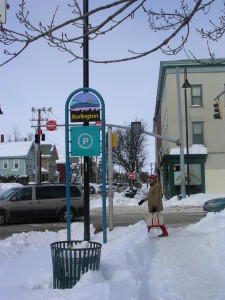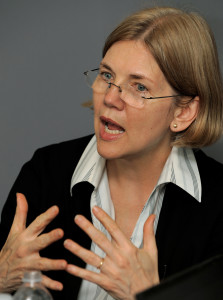Continue reading Fair Housing Workshop for Refugee and Immigrant Service Providers
Category Archives: Event
What Makes Your Community Thrive?
News: Groundbreaking Marks French Block Housing Start In Montpelier Vermont
Not bad, could be better: AARP’s take on BTV’s ‘livability’
A willingness to consider home-sharing is among the key findings of a new AARP survey of 500 Burlington residents age 45 and older.
 When asked if they would be open to a home-sharing arrangement with a person who could provide services in order for them to continue living in the home, 56 percent of the respondents said yes. That was up from 36 percent in an AARP survey nine years ago.
When asked if they would be open to a home-sharing arrangement with a person who could provide services in order for them to continue living in the home, 56 percent of the respondents said yes. That was up from 36 percent in an AARP survey nine years ago.
The new response suggests a pent-up demand for more accessory dwelling units on properties where older Burlingtonians want to age in place — which most respondents clearly wish to do. Seventy-nine percent “strongly agreed” when asked about their desire to remain in their current home, and 80 percent rated Burlington as a good or excellent place for older people to live.
The home-sharing finding suggests that current services, mentioned in a previous post, are undersubscribed. It also points to a need for a supportive regulatory climate for accessory dwelling units, which are, after all, an important piece in the chronic puzzle of how to come up with more affordable housing.
Another housing finding of note: Asked their opinion about building moderate- to low-income housing units in vacant lots in Burlington, 67 percent responded favorably, with 32 percent opposed. These numbers might have been slightly higher/lower is the question had used the contemporary term of choice, “affordable housing,” which has a nicer ring but which is, we have to admit, something of a euphemism.
Asked for their concerns about what might make it difficult to age in place, “high cost of living” topped the list, but it remains unclear which kinds of costs, specifically, are at issue.
Besides housing, transportation and “community engagement” were spheres covered by the telephone survey, which comprised 20-minute telephone interviews of randomly selected people. The margin of error was 4 percent. To see the full survey, “The Path to Livability: A Citizen Survey of Burlington, Vermont,” click here.
A presentation of the survey results by researcher Joanne Binette was made in AARP’s Burlington office to an audience of about two dozen people, among them housing and transportation specialists.
Older people in Burlington get around in multiple ways. Driving is still the main way (83 percent), but these people also walk (68 percent) and bike (41 percent) or take the bus (27 percent) at least some of the time.
Generally, they find it easy to get around even if they couldn’t drive (66 percent). The main drawback to bus service, they said, was the lack of weekend or evening service. (One set of bus concerns relates to schedules and routes, another to bus stops and access to them.)
Fifty-fi ve percent said they would bicycle if conditions for cyclists were better.
ve percent said they would bicycle if conditions for cyclists were better.
But are the streets safe? Apparently they’re more so for bicyclists (51 percent said streets are safe for cyclists) than for people with disabilities (41 percent), older people (36 percent) or children (33 percent) or pedestrians (27 percent).
Respondents had opinions on improving sidewalks and bus service, but appeared to be relatively satisfied with educational and social activities available to them in Burlington.
Sleeper issue snoozes on
 We’ve read through the transcripts of the two GOP-presidential-candidate debates held on CNBC last night, in order that — to steal one of Gail Collins’ recurrent lines — you don’t have to do it.
We’ve read through the transcripts of the two GOP-presidential-candidate debates held on CNBC last night, in order that — to steal one of Gail Collins’ recurrent lines — you don’t have to do it.
The two debates, of course, featured the “undercard,” with four candidates, and the “main card,” with 10.
In nearly four hours of discussion, the word “housing” was uttered once. That was when Rand Paul lambasted the Federal Reserve Board for, among other alleged malfeasances, having “caused the housing boom and the crisis…”
The candidates had nothing to say — nor were they asked by their CNBC interlocutors — about the housing unaffordability that afflicts millions of Americans, or about persistent residential segregation by race and income. And they had virtually nothing to say about the bubble-burst that ushered in the Great Recession. Maybe that’s partly because the bubble was fed by the kind of deregulation that small-government proponents are fond of promoting.
True, six of these candidates had been given brief opportunities to hold forth at a daylong “housing summit” in New Hampshire that we noted last week (here’s yet another account of that event, by the way), but it seems unlikely they were each talked out after that experience. Perhaps they, their fellow contenders, and the CNBC panel all agree with Chris Christie’s comment at the summit that housing is an unsexy issue that “kind of depresses people.”
On the other hand, the candidates talked a lot last night about other things they presumably think are depressing, such as ”big government” and taxes. One might have expected that housing could get some attention in a debate that was supposed to focus on economic matters.
Perhaps the candidates believe that their various plans for shrinking government and “growing” the economy will jump-start the private market to spur housing development, raise incomes of working families, and take care of the affordable housing problem. If so, it would be nice if they’d explain in some detail how that will work.
It would be even nicer if reporters would start making them talk about it.
A non-presidential candidate gets to the point
Elizabeth Warren, the Massachusetts senator, gave a speech Sunday in Boston that the website “Salon” called “the realest talk on race by any American politician.” She delivered her remarks at the Edward M. Kennedy Institute for the United States Senate as part of a “Getting to the Point” lecture series.
She had something to say about violence, about voting, and about economic justice – and economic justice as it relates to housing. Some excerpts:
“For most middle class families in America, buying a home is the number one way to build wealth. It’s a retirement plan-pay off the house and live on Social Security. An investment option-mortgage the house to start a business. It’s a way to help the kids get through college, a safety net if someone gets really sick, and, if all goes well and Grandma and Grandpa can hang on to the house until they die, it’s a way to give the next generation a boost-extra money to move the family up the ladder.
“For much of the 20th Century, that’s how it worked for generation after generation of white Americans – but not black Americans. Entire legal structures were created to prevent African Americans from building economic security through home ownership. Legally-enforced segregation. Restrictive deeds. Redlining. Land contracts. Coming out of the Great Depression, America built a middle class, but systematic discrimination kept most African-American families from being part of it.
“State-sanctioned discrimination wasn’t limited to homeownership. The government enforced discrimination in public accommodations, discrimination in schools, discrimination in credit-it was a long and spiteful list.”
Here we interject that she’s just scratching the surface of the federal government’s tawdry history of promoting residential segregation by race. For an eye-opening summation, check out what Richard Rothstein, of the Economic Policy Institute, had to say at the recent HUD conference in Washington. See the video we posted previously.
We note also the racial disparity in home ownership. In 2010, in Vermont, according to the 2012 “Analysis of Impediments to Fair Housing Choice,” the home-ownership for whites (71.4 percent) was nearly twice that for blacks (32.5 percent).
Warren went on to talk inequality over the last few decades, including the disparate effects of predatory lending that preceded the housing crash:
“Research shows that the legal changes in the civil rights era created new employment and housing opportunities. In the 1960s and the 1970s, African-American men and women began to close the wage gap with white workers, giving millions of black families hope that they might build real wealth.
“But then, Republicans’ trickle-down economic theory arrived. Just as this country was taking the first steps toward economic justice, the Republicans pushed a theory that meant helping the richest people and the most powerful corporations get richer and more powerful. I’ll just do one statistic on this: From 1980 to 2012, GDP continued to rise, but how much of the income growth went to the 90% of America – everyone outside the top 10% – black, white, Latino? None. Zero. Nothing. 100% of all the new income produced in this country over the past 30 years has gone to the top ten percent.
“Today, 90% of Americans see no real wage growth. For African-Americans, who were so far behind earlier in the 20th Century, this means that since the 1980s they have been hit particularly hard. In January of this year, African-American unemployment was 10.3% – more than twice the rate of white unemployment. And, after beginning to make progress during the civil rights era to close the wealth gap between black and white families, in the 1980s the wealth gap exploded, so that from 1984 to 2009, the wealth gap between black and white families tripled.
“The 2008 housing collapse destroyed trillions in family wealth across the country, but the crash hit African-Americans like a punch in the gut. Because middle class black families’ wealth was disproportionately tied up in homeownership and not other forms of savings, these families were hit harder by the housing collapse. But they also got hit harder because of discriminatory lending practices-yes, discriminatory lending practices in the 21st Century. Recently several big banks and other mortgage lenders paid hundreds of millions in fines, admitting that they illegally steered black and Latino borrowers into more expensive mortgages than white borrowers who had similar credit. Tom Perez, who at the time was the Assistant Attorney General for Civil Rights, called it a “racial surtax.” And it’s still happening – earlier this month, the National Fair Housing alliance filed a discrimination complaint against real estate agents in Mississippi after an investigation showed those agents consistently steering white buyers away from interracial neighborhoods and black buyers away from affluent ones. Another investigation showed similar results across our nation’s cities. Housing discrimination alive and well in 2015.”


